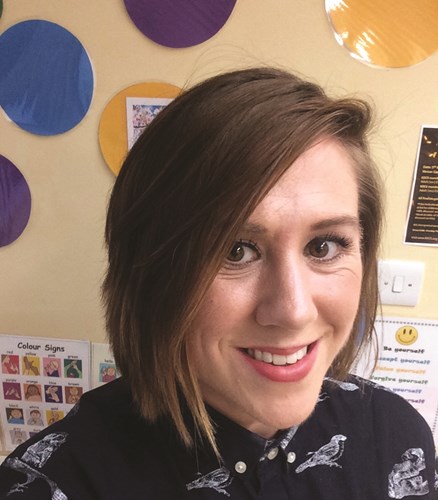Occupational Therapist, Deaf Child and Adolescent Mental Health Services
Eleanor Whitman, Clinical Specialist Occupational Therapist from Deaf Child and Adolescent Mental Health Services (Deaf CAMHS) in England.

Eleanor works with deaf children who are experiencing emotional, behavioural and mental health problems including anxiety, challenging behaviour, difficulties with attention and focus, and social communication issues.
What is Deaf CAMHS?
It’s a child and adolescent mental health service in England that offers accessible support to deaf children and young people and their families. Deaf children can be at greater risk of mental ill health and can be disadvantaged in accessing mainstream mental health services.
We work with children from 0-18 who either have severe to profound hearing loss, use British Sign Language (BSL) as their preferred language or have a significant language impairment related to moderate to profound hearing loss (which has a recognised impact on mental wellbeing). We also work with children of deaf parents.
When and how might a child be referred to you?
Children can be referred to our service by any professional working with them who feels their mental and emotional wellbeing needs supporting. We work with children (and their families) with a wide range of emotional, behavioural and mental health problems that are having an impact on their daily lives. These include anxiety, challenging behaviour, difficulties with attention and focus, and social communication issues.
What sort of support can you offer a child?
First we gather information to understand how we can work as a team with the family and others supporting the child to improve their sense of inclusion and self-esteem. Different types of support are available such as sessions focusing on communication, family work, talking therapies, medication, treatments, sensory based interventions, and therapeutic play, which can be useful for children with limited language skills. We have staff with a range of BSL skills and use registered, qualified interpreters. Deaf CAMHS have also developed specialist assessments looking at specific areas of difficulty, such as social communication, and what might be causing these, for example delayed language or autism.
Do you have any tips for parents whose children might be struggling with their deaf identity?
Young people have told us it’s important to have deaf friends, which can be difficult at a mainstream school or as a resident at a deaf school far from home. Accessing local National Deaf Children’s Society events is a good way for deaf children to build relationships with others nearby.
We also encourage people to talk openly about mental health. One in 10 children will face mental health issues in any given year and many still find it hard to talk about it due to fear of stigma.
What should parents in Wales, Scotland and Northern Ireland do if they need support for their child?
You should access mainstream CAMHS services. It’s important to make sure professionals have as much information as possible about your child’s deafness so they can try to understand if and how it may be impacting on your child’s mental health.
Remember you have the right to access BSL interpreters if this would be helpful to your child, and these should be provided by the service you’ve contacted.
To find out more visit the NHS page on national deaf services.
